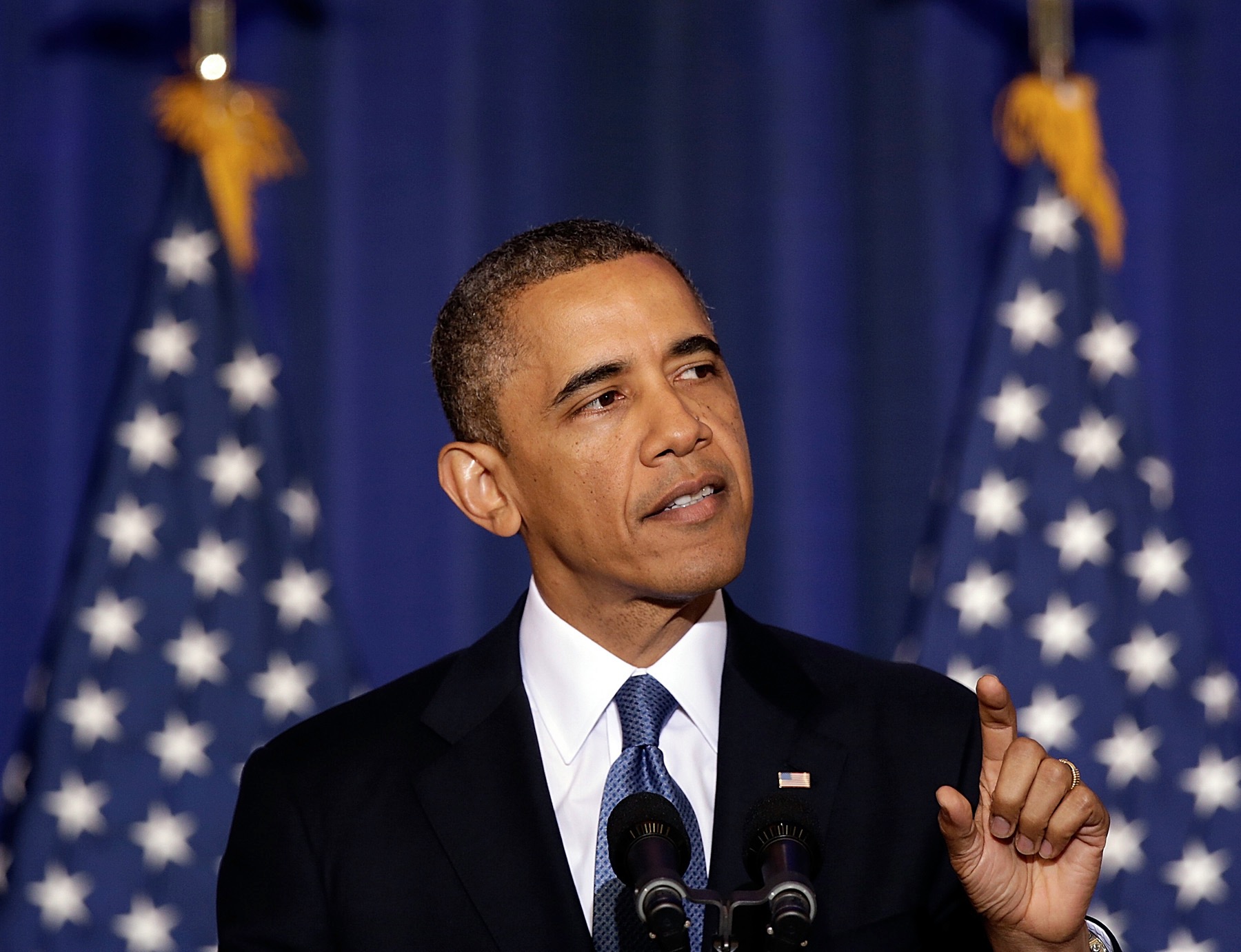In the first working week of his last calendar year in office, President Barack Obama defied Congress and pursued long-stalled gun control methods through executive action.
On Tuesday, Obama delivered a speech at the White House outlining his proposals, joined by former Rep. Gabrielle Giffords (D-Ariz.), who survived a shooting five years ago, and Mark Barden, the father of one of the 20 children killed in the 2012 Sandy Hook Elementary School shooting in Newtown, Connecticut.
Tearing up during his remarks, Obama emphasized a point he’s made after the many mass shootings that have occurred during his presidency, saying that America is “the only advanced country on Earth that sees this kind of mass violence erupt with this kind of frequency.”
“Somehow, we become numb to it and we start thinking, ‘This is normal,'” Obama said. “Instead of thinking about how to solve the problem, this has become one of our most polarized, partisan debates,” he added.
The series of proposals, unveiled by the administration on Monday, are designed to close gaps in the federal background check system for gun purchases, allocate millions of additional dollars to mental health services, and kick-start so-called smart gun technology.
Republicans denounced the proposals before their debut, labeling them unconstitutional and predicting a contentious legal battle.
“This is a dangerous level of executive overreach, and the country will not stand for it,” said House Speaker Paul Ryan (R-Wis.).
Despite the opposition, Obama remained resolute. Aides noted that few issues have frustrated him more than the inability to forge a legislative consensus around gun control measures, which failed to pass the Senate following the Newtown shooting amid fierce opposition from the National Rifle Association.
“The gun lobby may be holding Congress hostage right now, but they cannot hold America hostage. We do not need to accept this carnage as the price of freedom,” the president said.
“Every time I think about those kids, it gets me mad,” he added, referencing the children who died in Newtown. “And by the way, it happens on the streets of Chicago every day.”
Obama’s executive actions, aides said, stemmed from this deep sense of frustration.
“These are not only recommendations that are well within my legal authority and the executive branch, but they’re also ones that the overwhelming majority of the American people, including gun owners, support me doing,” Obama told reporters on Monday.
Though gun control advocates welcomed the executive actions, their potential impact remains uncertain.
Attorney General Loretta Lynch noted that there was no legal basis for declaring that firearms sellers conducting more than a certain number of sales should qualify as businesses subject to the background check system.
Instead, the administration aims to enhance the process by issuing tighter guidance rather than introducing new regulations.
This approach, Lynch said, allows for quicker implementation but raises questions about why the president waited over two years after Newtown to start the process.
Key elements of the new guidance include the Bureau of Alcohol, Tobacco, Firearms and Explosives finalizing two rules: one requiring background checks for people attempting to purchase dangerous firearms through a trust, corporation, or other legal entity, and another mandating that those who ship firearms notify law enforcement if the weapons are lost or stolen in transit.
“During the first part of 2016, ATF is going to engage in the business of educational initiatives targeting not just gun shows, but flea markets and other places where guns tend to be sold, as well as reaching out to online dealers,” Lynch said.
“They will continue to look at those dealers who sell to prohibited people, and we will be looking to see whether or not people comply with this regulation or whether there are those who still seek to hide in the shadows or behind exceptions to continue selling firearms without doing what’s required.”
The administration also plans to streamline the current background check system by proposing that the FBI hire 230 additional examiners to help process background checks on a 24/7 basis.
The current system is overloaded, handling 63,000 background check requests per day, with 91 percent completed within the three-day limit allowed by law.
Additional components of the president’s proposals include directives to the Departments of Defense, Justice, and Homeland Security to research gun safety technology and a proposal for $500 million in additional funding for increased access to mental health care.
However, the mental health funding requires congressional appropriation, highlighting the limits of the president’s executive actions.
Congress still has a say in these matters, either by rejecting funding requests or by proactively removing funds from federal agencies if the executive actions proceed.
“I have formally notified Attorney General Lynch that I will aggressively protect our Second Amendment rights using Congress’ power of the purse,” said Rep. John Culberson (R-Texas).
“I notified the attorney general that if the Department of Justice attempted to create new restrictions on our constitutional rights that I would use every tool at my disposal to immediately restrict their access to federal funding.”
The administration expressed confidence that Obama’s actions were legally sound. “We’ve looked at this from a number of angles and proposed this guidance in a way that we think is consistent with existing law, as well as consistent with the Second Amendment,” said Lynch.







